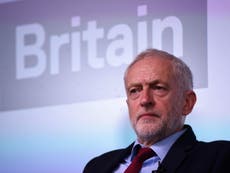As someone who used to be homeless, here's why I would never contemplate voting for Owen Smith
As a person who has witnessed an 18-year-old friend hang her head in shame as she told me she solicited oral sex for £20, I often wonder how differently politicians would treat the welfare debate if they knew the people I knew

Popularity or principle? The argument has become so repetitive in the run-up to the Labour leadership election that even I feel a bit ‘meh’. My friends, many of whom were once ardent supporters of Corbyn now murmur glumly that, “Well, maybe principles aren’t enough when you’ve got a man who can’t even get his MPs behind him.”
“The media not liking him can’t continue to be a valid PR-strategy,” they slur, eyes half-closed, bored of themselves already.
But there’s something very specific that keeps me from even being able to entertain the thought of voting for Owen Smith this week. It’s that now-forgotten episode from last summer, when he supported a nasty Tory welfare bill, alongside 183 other Labour MPs. The bill that could have been stopped if they had unified with other parties against it.
That bill was the beginning of a swathe of cuts to policy that once promised roofs over the heads of homeless young people, as well as Employment Support Allowance, which provides some of society’s poorest with a weekly balance that (just about) covers food to eat.
Last year, Corbyn was the only leadership candidate to have voted against that bill. This year, he still is. Despite Owen Smith’s public apology for his decision, his inability to defy the party whip on what really mattered at a time when it didn’t benefit him has to be a telling tale of what a party under his leadership would look like.
Having been on at least two of those forms of welfare when I was young and homeless, the inability of the party to fight that bill was quite the blow for me as a Labour supporter. As a person who has witnessed an 18-year-old friend hang her head in shame as she told me she solicited oral sex for £20, I often wonder how differently politicians would treat the welfare debate if they knew the people I knew. I looked into the eyes of that friend and begged her to ask me for cash that time – but at the same time I knew that I probably wouldn’t be able to survive on my paltry allowance if she did. I wonder whether any politician understands the realities of living on benefits.
Because no mistake can be made here: political parties make reasoned decisions about who they are willing to leave behind from one year to the next. That year, the Labour Party chose the most vulnerable. Their decisions included agreeing to a cap on what benefits a family could receive regardless of its size or personal circumstance – something that Corbyn actively spoke out against, while Smith tacitly supported it. Of course, every politician can’t be held to account for the overall decisions of the party, but they can for their voting record. They certainly can for not voting against Tory policy – a point simple enough that it was summed up in a less than 140-word tweet by Diane Abbott that day: these people were not brought into parliament to abstain.
The experience of being homeless and on benefits as a teenager is so rare that politicians can easily overlook such people. But Labour is supposed to be committed to the idea that we should protect the most vulnerable in society; that’s what made me a Labour voter in the first place. On the day that MPs abstained from voting against that bill, tears of hot shame rolled down my face. I felt I’d been hoodwinked into believing that Labour stood for what they said they did.
What followed Jeremy Corbyn’s election for many party members last year was an enormous high. A few days before voting ends, I’m speaking to those still sitting in the lull of its comedown. I am asking them to remember the exact temperature of their own rage last year, when that vote was cast. I want them to forget their lukewarm doubts about leadership; about sandals; about the media; and to remember how it felt to be represented by a party that was willing to sacrifice the most vulnerable as collateral damage for its own popularity. Maybe if they can hold on to the feeling of being ashamed of their own party, feeling ‘meh’ about the new leader won’t feel so bad after all.


Join our commenting forum
Join thought-provoking conversations, follow other Independent readers and see their replies